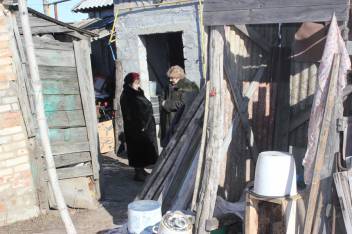 I’m currently in Sloviansk in eastern Ukraine, talking to older people from the non-government controlled areas of Donietsk and Luhansk.
I’m currently in Sloviansk in eastern Ukraine, talking to older people from the non-government controlled areas of Donietsk and Luhansk.
So many are on their own, frail and with very little money. The temperature outside is freezing, around minus 10 degrees Celsius.
Without medicines or money
One man I met had lost all his family and his home in a shell attack in Luhansk. Afterwards he’d collapsed in the street from his head injuries, suffered a heart attack and was taken to hospital.
Now living in a run-down hostel in government controlled Severodonetsk, his glasses were cracked and he’d run out of heart medicine. He had no money to buy any more. But he told us that if he could buy the medicine, the Red Cross would administer the injections for free.
We met refugees from Debaltseve living in several railway carriages at Sloviansk railway station. A frail woman of 73 called Nina was sharing a sleeper compartment with people she’d never met. She was completely alone. She was a gentle woman suffering from Parkinson’s disease but was still very independent.
The place stank and several men were standing around drinking. Security staff came on board to check people’s papers but anyone could get in.
Families separating
An older couple, Leonid and Nadezhda, from Pervomaisk in the non-government controlled area were typical of what is happening. Their son had moved to Kiev with his family and their daughter was staying with an older woman in a village outside Luhansk. She didn’t know how her daughter was managing to survive.
Many people talked about their families separating – some children going to Russia while others moved west to Ukraine.
Nadezhda said they had come to Severodonetsk with only the clothes they were wearing.
Leonid was very poorly but in good spirits. The local social services department had helped them with accommodation and now they were living in a two room bungalow in Borovskoye village.
Living on the frontline
The mayor, Lidia, in her late sixties, said she had been given the keys by the owners and they’d agreed that any refugees could live there. This village was 25 kilometres away from Severdonetsk and only about 40 kilometres from the frontline.
Last summer armed groups had tried to set up a check point in the village but she and 80 other women turned up with pitchforks and had seen them off. Nadezhda, although physically fitter than her husband, was broken and cried constantly.
A recent arrival from Debaltseve was furious. “We speak Russian but we are Ukrainians and no one forced us to speak Ukrainian. We have always wanted to be part of Ukraine,” he said. “Everything has been destroyed”.
His 70-year-old father Vladimir had suffered a stroke and was clearly finding things very difficult. Their granddaughter seemed to be the only ray of hope. “Now I have nothing to be afraid of. We just want the war to be over,” she said.
How we’re helping
Most people have registered as refugees, some are receiving small amounts of money, some food vouchers. Many people seemed to be unaware of what was available and heard about things in a haphazard way. The Red Cross was giving out free bread in Severodonetsk but for older people, standing in a queue in freezing temperatures is out of the question.
HelpAge’s partner TLU (Turbota pro Litnix v Ukraini) have sent several consignments of food, blankets, bedding and clothes to residential care units, housing older and disabled people in non-government controlled areas in Donbass.
TLU Director Galina Poliakova said: “We’re going to continue to send humanitarian aid to very old and frail people because they need targeted help. They cannot wait in line – some are immobile and need food delivered to their homes.”
We did manage to find the medicine for the man who needed it – let’s hope he finds enough money for the next batch.
Read more about our work to support older people in emergencies.
